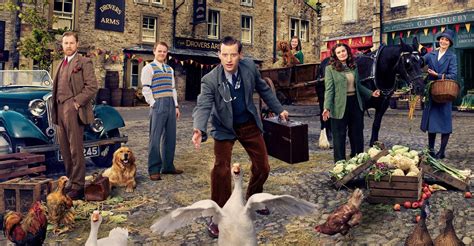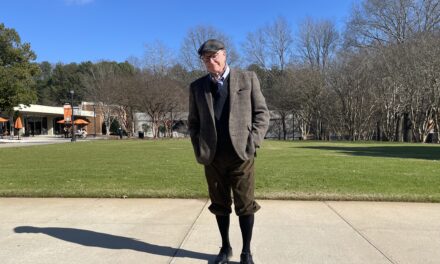All Creatures Great and Small on PBS is now in its third season. Would that it were its last; however, I have a sickening feeling the series is just building up steam for a fourth, fifth, who knows, even a tenth season. If Midsomer Murders can go twenty-three seasons, why shouldn’t PBS give James, Siegfried, and Tristan just as many, seeing that the show is widely popular?
Well, there are reasons, very good reasons, for canning the show once the current season ends. I could offer any number of instances where it strays and strays flagrantly from James Herriot’s (aka Alf Wight’s) books: Mrs. Hall as half mother hen, half Minerva; Tristan’s boo-hooing over a cow he must euthanize; James’ near nervous breakdown over a threat of malpractice; Helen’s jilting of “Hugh,” a character the real James Herriot never dreamed of; and episodic crises involving one and all, surely meant to tug heartstrings and jerk tears.
Now, you may ask, “What’s wrong with that? Haven’t you said that most TV is melodrama? Isn’t melodrama entertaining?” Yes, I’ve said that more than once. Indeed, I take most programs for what they are, and if I can stand them, I gladly give them a guarded nod of approval or, at the very least, tolerance.
But All Creatures Great and Small isn’t supposed to be soap opera; it’s comedy—comedy as surefooted in plot, pacing, and character as P. G. Wodehouse’s (once of Herriot’s and my favorite authors) universe, albeit in a very real setting. His world is populated by James, the new vet, somewhat callow but learning every day; Siegfried, the eccentric, unpredictable, hilariously contradictory owner of the practice; Tristan, his ne’er-do-well, womanizing, mischievous, beer-quaffing, vet-school-exam-failing brother; Helen, James’ patient, devoted wife; Mrs. Hall, the sixty-something, crotchety yet lovable housekeeper; and a cast of tight-fisted, weather-bitten Dales’ farmers who seem to be waiting for the “vet’nary” to slip up. Herriot’s chemistry works through a masterly blend of these ingredients, and although there are occasional crises, the books are and are meant to be funny.
Plenty of readers and viewers of the books and original All Creatures series understand this. Take Samuel West who plays Siegfried in the new version. He told an interviewer that when he got the part, he decided to go back and re-read the books. His reaction? I’m quoting from memory, but I recall he said, “I’d forgotten how funny they were.” My reaction to the statement was “Who wouldn’t remember they were funny?” But after further reflection, I guessed—and, yes, it’s only a guess—why he answered the way he did: he’d read the script in which the laughs are few and far between.
Now in its third season, the lack of humor has become a less than positive feature. One need look no further than Siegfried as currently written to see how un-funny the show remains. In Herriot’s books and the old All Creatures series, Siegfried (played then by Robert Hardy) regularly tells James firmly to do one thing, for example, to economize in his use of thread and antiseptic, only the next day to lecture him in the most paternal fashion on behaving more flamboyantly, in other words, using more thread and more antiseptic. These contradictory moments become an hilarious tick in Siegfried’s character that alternatingly irritate and amuse James.
Do we see such things happen in the new All Creatures? Very rarely, and when the script makes room for them, the handling is so perfunctory and otherwise so mired in the crisis that dominates the episode that the humor simply evaporates. Siegfried’s temper tantrums are not eccentric at all; they’re simply instances of sourness and ego. Among his explosions of wrath—and they are not rare—he blows up at James, whom he has made partner in the practice, for being his partner (he didn’t really want one anyway!); he jumps all over Helen for offering an opinion about the running of the clinic (it’s his clinic!); he humiliates Tristan even when his brother has done nothing wrong. Only Mrs. Hall escapes the weekly tongue-lashing (she is, after all, the presiding goddess hovering over Skeldale House).
Overall, one might think Siegfried, as the Brits would say, a pure bastard. But allowances must be made. You see, Siegfried is a veteran of the Great War of 1914 – 1918. There must be inner demons he wrestles with nightly, and indeed there are. As a vet, he took care of patriotic British horses in war-torn Belgium, and in episode 3, he’s contacted by his former major to deal with an uncooperative racehorse. All of this triggers sad memories of the war. Now in the first book, Herriot informs his readers that Siegfried is in his early thirties. Since the book takes place just before World War II, Siegfried must have been about twelve years old when the first war ended. One can only congratulate the British army for promoting “men” that young to the officer corps.
Siegfried in his new incarnation is a widower as well as an ex-officer and somewhat tentative about entangling himself with women. That may explain why one love interest in season one simply disappears by season two. Did she, an attractive middle-aged woman, find out how old Siegfried really was? Was she too old for the boy?
But where was I? Ah, yes, I said the new All Creatures might go on for years and years. The reason is clear enough. Its creators have managed to ignore so completely what James Herriot wrote that there’s no limit to what nonsense they can concoct. If the principal actors live long enough, Siegfried may manage to marry two more times and participate in World Wars III, that is, provided he doesn’t succumb to a stroke during one of his tirades or get murdered by Helen after another insulting outburst. For the producers and scriptwriters, the business is an absolute goldmine; for lovers of James Herriot, it’s a seasonally recurring headache.














